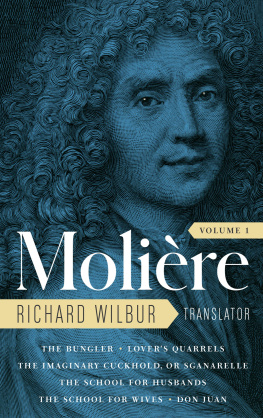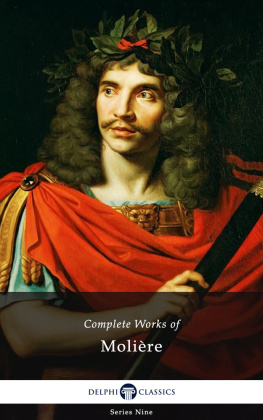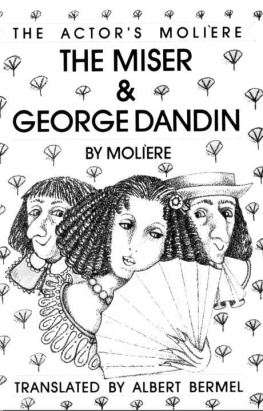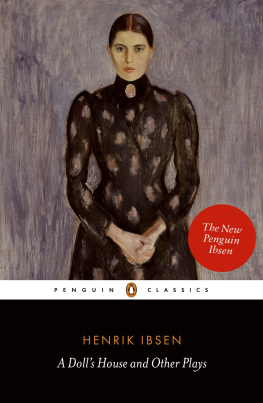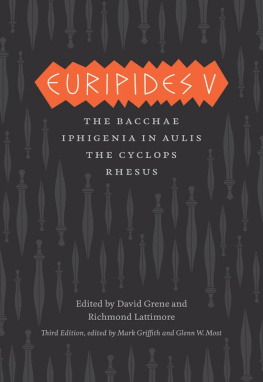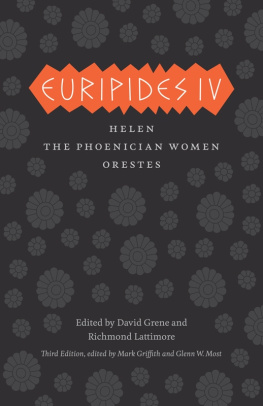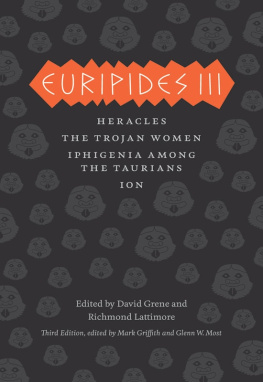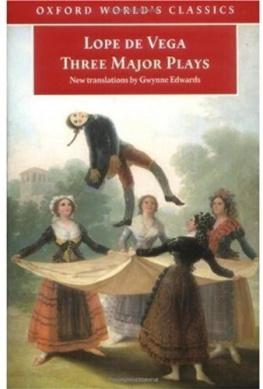DRAMA CLASSICS
THE MISER
by
Molire
translated and introduced by Martin Sorrell

NICK HERN BOOKS
London
www.nickhernbooks.co.uk
Contents
Introduction
Molire (1622-1673)
Jean-Baptiste Poquelin (later known as Molire) was baptised in the St Eustache Church, Paris, on 15 January 1622, but the precise date of his birth is not known. Both his parents were in the upholstery business, enjoying considerable success and wealth. Between 1633 and 1639 Molire was educated at the Jesuit Collge de Clermont, now the Lyce Louis-le-Grand. In 1642, he was a law student in Orlans, and in the following year he renounced his succession to his father as tapissier du Roi (upholsterer-royal), preferring instead to join the newly-formed Illustre Thtre company in Paris. In 1644, he adopted the name Molire, and this marks the beginning of his celebrated career as actor-manager-playwright. His first full-length play, The Scatterbrain , was put on in 1655.
The company at first toured the provinces, then returned to Paris in 1658 and shared the Petit-Bourbon theatre with the Italian commedia dellarte players. Molire also received the patronage of the Kings brother, Philippe dOrlans. 1659 saw the great success of The Pretentious Ladies . In 1661, the company was forced to move to a different theatre, the Palais-Royal. In 1662, Molire married Armande Bjart, then aged around 20. She was either the daughter or the sister of Madeleine Bjart, with whom Molire had set up the Illustre Thtre some twenty years before. Moliresacutely pertinent and highly successful The School for Wives was given later in 1662. The next year, he was granted a royal pension of 1,000 livres, and in February 1664 the King himself acted as godfather to his first child, Louis. In May of the same year, the first version of Tartuffe was given privately before the King, but was immediately banned for public performance.
In 1665, Molires company became the Troupe du Roi, and his annual royal pension was raised to 6,000 livres. In the early part of 1666, Molire became seriously ill with pneumonia and had to give up acting for many months. The summer of that year saw The Misanthrope and Doctor in Spite of Himself . Then, in 1667, Tartuffe , renamed The Impostor , was given a public performance. 1668 saw first productions of Amphytrion, George Dandin, The Miser , 1669 Monsieur de Pourceaugnac , 1670 The Would-be Gentleman , 1671 Scapins Tricks , 1672 The Learned Ladies. Molires last play, The Hypochondriac , opened on 10 February 1673, but, by its fourth performance, on 17 February, Molires illness, probably tuberculosis, had become critical. He was performing the title role of Argan, the hypochondriac, and by all accounts doing so with great energy and gusto. Then, near the end of the performance, in the third interlude, he was taken violently and suddenly ill, but he managed to struggle through to the end of the performance. He was rushed back to his house in the Rue de Richelieu, where he died shortly after. He was buried on the 21st, in the St Joseph cemetery, during the night the penalty for not having made, in the presence of a priest, a death-bed denunciation of his actors life.
The Miser : What Happens in the Play
Act 1. The action takes place in Paris, at the house of Harpagon, a rich bourgeois, a widower with two children, Clante and lise. lise has just become secretly and unofficially engaged to Valre, a young Neopolitan of good birth, who, years earlier, had saved her life. He has found a way of attaching himself to the household by becoming Harpagons steward. As for Clante, he is in love with a penniless young woman, Mariane, and wishes to marry her. The brother and sister fear that their marriage plans will be blocked by their father, Harpagon, whose obsessive avarice has turned him into the family tyrant. But he is prey to a huge anxiety of his own. His fear is that the ten thousand gold coins he has buried in his garden will be discovered by thieves. His fear is all-consuming. He accuses La Flche, his sons valet, of a theft that has not even occurred, searches him, and throws him out. Then he meets his two children, and reveals his intention to marry Mariane, and to give lise in marriage to an old man, Anselme, who happens to be a friend of his. As for Clante, he must marry a certain widow. lise energetically opposes her fathers plan for her, prompting Harpagon to ask Valre to win her round, an irony which puts the steward in an invidious position.
Act 2. Clante, who needs to borrow fifteen thousand francs , learns not only that the proposed lender wants to charge an extortionate rate of interest, but also that he intends to lend less than the full amount and make up the shortfall with items of worthless junk. On top of the anger which this situation provokes in Clante, he discovers that the lender is none other than his own father, Harpagon. Father and son trade abuse and insults. Frosine, a go-between whomHarpagon has engaged to negotiate his marriage to Mariane, tells him that Marianes mother has consented to the union. Frosine also lies to Harpagon that Mariane has a predilection for old men like him. The money-obsessed Harpagon, however, is tortured by the prospect that the impoverished Mariane will come without a dowry. Frosine tries to demonstrate that his brides well-known frugality will save Harpagon enough to make up for the lost income. Harpagon is deaf both to this argument and to Frosines own request for a personal loan.
Act 3. Convention obliges Harpagon to give a celebratory dinner at the signing of his wedding contract. He lectures his servants on ways in which they can keep down costs. Valre lends his insincere support by preaching austerity to Matre Jacques, the cook- cum- coachman, advice which soon provokes a fight. Matre Jacques is roundly beaten by Valre, and swears to get revenge. Full of apprehension, Mariane arrives and is taken aback by the outlandish appearance of Harpagon. Matters get worse when Clante enters, for Mariane recognises him as the young man who has been paying court to her. Using language with a hidden meaning lost on Harpagon, the two young lovers manage to communicate their true feelings to each other. Harpagon is neatly outsmarted by his son, who insists that Harpagons expensive ring is intended by the old man as a present to Mariane. When the arrival is announced of someone bringing money for Harpagon, he forgets all else and leaves the scene in eager anticipation.
Act 4. Frosine is in the middle of explaining to Clante and Mariane her strategy to make Harpagon renounce his marriage plan when the old miser suddenly appears,surprising his son in the act of kissing Marianes hand. Suspecting a plot, Harpagon pretends to have renounced Mariane. He hopes to make Clante come clean about his feelings for her. Clante falls into the trap, confessing his love for Mariane. Harpagon flies into a rage and threatens his son with violence. Matre Jacques arrives and, acting as intermediary between father and son, succeeds only in making matters worse. Finally, Harpagon disinherits Clante, curses him, and sends him packing. La Flche enters carrying Harpagons strongbox, which he has unearthed in the garden. But the miser quickly discovers the theft, bursts in and delivers himself of a delirious monologue composed of rage and despair.
Act 5. Harpagon has summoned a police officer, who interrogates Matre Jacques. The latter, spotting his chance for revenge, accuses Valre of the theft of Harpagons money. Valre arrives, and when Harpagon presses him to confess his crime, the steward thinks the old man means his secret engagement to his daughter lise. The cross-purposes get more embroiled, but eventually are disentangled. The furious Harpagon threatens to send his daughter to a convent, and to have Valre hanged. Seigneur Anselme arrives. Light is rapidly shed on a number of mysteries, and a dnouement full of coincidences is reached. Valre reveals his true identity and recounts his life story. It emerges that he is none other than the son of Seigneur Anselme who, in his turn, is revealed as the father not just of Valre, but of Mariane as well. Sixteen years earlier, a shipwreck had broken up this aristocratic Neapolitan family, scattering them in various directions. Thanks to these amazing revelations, everything falls satisfactorily into place. A doublemarriage will unite Valre with lise, and Clante with Mariane. Anselme is only too happy to set up both couples financially, and to cover the costs of their marriages. Harpagon, however, has the last word he will go off to be reunited with his beloved box of money.
Next page

